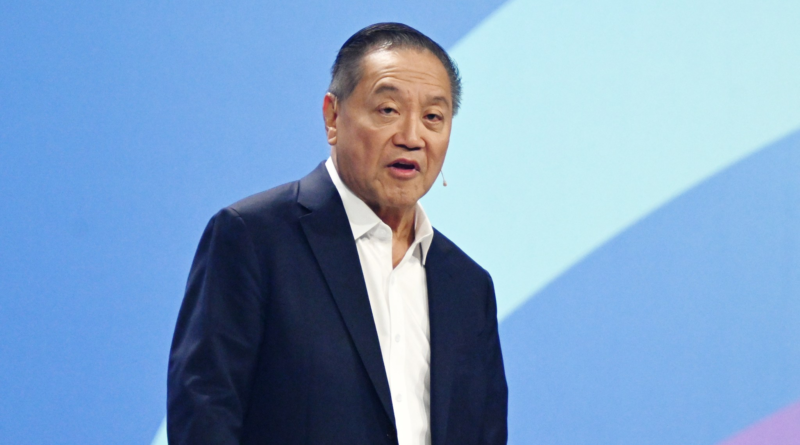An $803-billion company most people have never heard of just knocked Tesla out of the Magnificent 7
With hardly anyone noticing, a tech titan you’ve probably never heard of has booted Tesla out of the heavily-hyped Magnificent Seven. Can it stay there?
The overlooked Magnificent Seventh is Broadcom, a tech company that produces both hardware and software. It’s well known in the infotech world but unfamiliar beyond it. The Magnificent Seven, conceived as a group of stocks in early 2023, are the most valuable U.S. tech companies by market capitalization. In descending order they include Apple (recent market cap: $3.4 trillion), Microsoft, Nvidia, Alphabet, Amazon, Meta, and Tesla (recent market cap: $768 billion). Yet Broadcom’s market cap slipped past Tesla’s last spring and has stayed ahead of the EV-maker for most of the year. Its market cap is currently around $803 billion.
Broadcom is not guaranteed to stay ahead of Tesla, at least in the near term. Tesla’s stock is notoriously volatile, and its market cap could plausibly beat Broadcom’s for a time. But Broadcom’s long-term outlook is by far the sunnier of the two. Wall Street analysts on average expect its stock price to keep climbing, while they expect Tesla’s to continue to fall. Tesla’s stock has retreated to where it was almost four years ago, while Broadcom’s is up 290% since then.
So how did this quiet giant sneak into the highest reaches of tech royalty? Mostly by a combination of tech savvy and financial acumen. The company is a grandchild of Hewlett-Packard, which in 1999 spun off a company called Agilent Technologies, which in turn spun off a company called Avago to a pair of private equity firms in 2005. Avago began buying up semiconductor firms, in 2015 buying a big one called Broadcom and taking its name.
Broadcom’s PE ancestry has guided it ever since that spinoff. “Broadcom operates pretty much like a PE firm, where it invests in assets that can deliver quick returns,” says Naveen Chhabra, an analyst at the Forrester research and consulting firm. It’s “astute in terms of investing in firms where it can maintain or grow the revenue” and at the same time “can turn the company into a high margin business.”
Exhibit A is Broadcom’s biggest acquisition, the cloud-computing firm VMware, which it bought last November. A Forrester report for VMware customers warns them, “Don’t let the price jumps shock you…. In most cases, customers will find the renewal quotes multiple times higher than what they paid in the past.”
Wall Street approves of Broadcom’s changes. “They appear to be killing it on VMware,” says Bernstein analyst Stacy Rasgon, “which markedly exceeded expectations in the quarter and which seems poised to continue growing.”
Shrewd acquisitions and management are central to Broadcom’s growth but don’t fully explain the company’s phenomenally swelling market cap. The other crucial factor is, not surprisingly, the AI frenzy. One of Broadcom’s most important businesses is designing semiconductors—computer chips—and in the past year, demand has been sky high. Broadcom’s sales of AI chips in fiscal 2023 were $4.2 billion, BofA Securities reports. The firm expects AI chip sales will rocket to $12.1 billion this year and $16.9 billion next year.
Broadcom’s chip expertise along with VMware’s success has propelled Broadcom’s market cap from just above that of McDonald’s when OpenAI released ChatGPT in November 2022, to Magnificent Seven levels today.
A critical element of Broadcom’s success and its future is CEO Hock Tan, who was recruited to run the company when Avago was spun off in 2005. Now age 72, he was born in Malaysia and earned engineering degrees from MIT plus an MBA from the Harvard Business School. He has spent most of his career in tech companies, though he also held finance jobs at PepsiCo and General Motors—thus the company’s joint expertise in technology and finance. In recent years, Tan has been among the most highly paid U.S. CEOs; he made $162 million last year. Succession is an obvious issue for the company, but no successor is apparent. Tan has said he’ll continue to run the company for at least four more years.
Wall Street analysts are mostly cheering for Broadcom. “Numbers look likely to keep going up,” says Bernstein’s Rasgon. “And valuation is looking increasingly attractive.” JP Morgan’s Harlan Sur says the stock “remains our top pick in semiconductors.”
No tree grows to the sky, but for now the sun is shining brightly on this company. Beyond that, the only certainty is that Broadcom can’t be anonymous anymore.



